-
oa Multidisciplinaire aanpak van interculturaliteit in de opleiding Neerlandistiek extra muros
- Amsterdam University Press
- Source: Internationale Neerlandistiek, Volume 63, Issue 1, Mar 2025, p. 57 - 76
-
- 01 Mar 2025
Abstract
The globalised multicultural cooperation of today’s world has led to inter- and transcultural communication and intercultural management becoming part of many professions in which Dutch Studies graduates extra muros are also employed. The department of Dutch Studies at Comenius University in Bratislava has, as part of its re-accreditation process, incorporated courses in intercultural communication and intercultural management into the curriculum. In this contribution, we argue why these courses are relevant for a study of Dutch language and culture. Methodologically, the delineation of the core concepts is based on, a.o., Bourdieu’s habitus concept (1977), the definition of intercultural communication and competence according to Pinto (2000; 2007) and Van Kalsbeek (2010), and Holtbrügge and Welge’s description of intercultural management (2010), using the cultural dimensions of Hofstede and Hofstede (2005). Based on this theoretical delineation and description of aspects of intercultural communication and intercultural management in the mentioned curriculum, we argue why these topics play an important role in the development of competences necessary in professions with a cultural profile.



